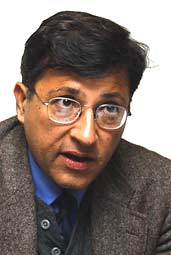Special Programs
Speaker Bios
 |
Paul Bloom Paul Bloom is a Professor of Psychology at Yale University. His research explores how children and adults understand the physical and social world, with special focus on morality, religion, fiction, and art. He has won numerous awards for his research and teaching, and is the past-president of the Society for Philosophy and Psychology, and co-editor of Behavioral and Brain Sciences, one of the major journals in the field. Dr. Bloom has written for scientific journals such as Nature and Science, and for popular outlets such as The New York Times, the Guardian, and the Atlantic. He is the author or editor of four books, including How Children Learn the Meanings of Words, and Descartes’ Baby: How the Science of Child Development Explains What Makes Us Human. His newest book, How Pleasure Works, will be published in June, 2010. |
 |
Samuel Bowles Samuel Bowles is Research Professor at the Santa Fe Institute where he heads the Behavioral Sciences Program. He is also Professor of Economics at the University of Siena. He taught economics at Harvard from 1965 to 1973 and at the University of Massachusetts, where he is now emeritus professor. His recent studies on cultural and genetic evolution have challenged the conventional economic assumption that people are motivated entirely by self-interest. These have included the mathematical modeling and agent-based computer simulations of the evolution of altruistic behaviors and behavioral experiments in 15 “hunter-gather” and other small-scale societies. Recent papers have also explored how organizations, communities and nations could be better governed in light of the fact that altruistic and ethical motives are common in most populations. Bowles’ current research also includes theoretical and empirical studies of political hierarchy and wealth inequality and their evolution over the very long run. |
 |
Robert Boyd Robert Boyd is a Professor of Anthropology at the University of California, Los Angeles. Dr. Boyd’s research is focused on the evolutionary psychology of the mechanisms that give rise to and shape human culture, and how these mechanisms interact with population dynamic processes to shape human cultural variation. He is the co-author of Not by Genes Alone: How culture transformed human evolution, Modeling the Evolution of Social Behavior, and The Origin and Evolution of Cultures, among numerous other books and scholarly publications on the topics of the evolution of group behavior, the development of cultures, social cooperation, and decision-making. |
 |
Jack Blum Jack Blum is a Washington lawyer who specializes on issues of money laundering, financial crime, and international tax evasion. He spent fourteen years as a Senate investigator with the Senate Antitrust Subcommittee and the Senate Foreign Relations Committee. He played a central role in the Lockheed Aircraft bribery investigation of the 1970’s which led to the passage of the Foreign Corrupt Practices Act, and in the investigation of the Bank of Credit and Commerce International. He is currently chair of Tax Justice Network USA, and the Violence Policy Center. |
 |
Leon Fuerth Leon Fuerth is the Director of the Project on Forward Engagement at the George Washington University and a professor at the Elliott School of International Affairs. He was the former national security adviser to Vice President Al Gore. In the early 1980s, Fuerth worked with then-Congressman Gore on issues of arms control and strategic stability. When Gore was elected to the Senate in 1985, Fuerth joined his staff as senior legislative assistant for national security. When Gore became vice president, he appointed Fuerth to be his national security adviser. Fuerth served on the Principals’ Committee of the National Security Council, alongside the Secretary of State, the Secretary of Defense, and the President’s own national security adviser. |
 |
Pervez Hoodbhoy Dr. Pervez Hoodbhoy has been a faculty member at the Department of Physics, Quaid-e-Azam University, Islamabad since 1973. In 1984 he received the Abdus Salam Prize for mathematics and, earlier, the Baker Award for Electronics. He is chairman of Mashal, a non-profit organization that publishes books in Urdu on women's rights, education, environmental issues, philosophy, and modern thought. Dr. Hoodbhoy has written and spoken extensively on topics ranging from science in Islam to education issues in Pakistan and nuclear disarmament. He produced a 13-part |
 |
Ray Jackendoff Ray Jackendoff is the Seth Merrin Professor of Philosophy and Co-Director of the Center for Cognitive Studies at Tufts University. His research centers around the system of meaning in natural language, how it is related to the human conceptual system, and how it is expressed linguistically. This has led him to a cognitive approach to traditional philosophical issues of inference and reference, embodied in his theory of Conceptual Semantics. In developing this approach, he has worked on the conceptualization of space, on the relationship between language, perception, and consciousness, and, most recently, on the conceptualization of such socially grounded concepts as value, morality, fairness, and obligations. In addition, in exploring how concepts are expressed in language, he has developed new models of the architecture of the human language faculty and its evolution. |
 |
Marcel Kinsbourne Marcel Kinsbourne is an Austrian-born pediatric neurologist and neuroscientist who was an early pioneer in the study of brain lateralization. He is presently a Professor of Psychology at both The New School in New York City and the Center for Cognitive Studies at Tufts University. |
 |
John Mikhail John Mikhail is a Professor of Law at Georgetown University. After graduating from Stanford Law School, where he was Senior Article Editor of the Stanford Law Review and Senior Submissions Editor of the Stanford Journal of International Law, Professor Mikhail joined the law firm of Simpson, Thacher & Bartlett. He then served as a judicial clerk to Judge Rosemary Barkett on the U.S. Court of Appeals for the Eleventh Circuit. |
 |
Gwyn Prins Gwyn Prins is a professor at the London School of Economics and the director of the LSE Mackinder Programme for the Study of Long Wave Events. He joined LSE in 2000 successively as Professorial Research Fellow and then (2002-7) took the first stint as the first Alliance Research Professor jointly at LSE and Columbia University, New York. For over twenty years he was a Fellow and the Director of Studies in History at Emmanuel College, Cambridge, and a Lecturer in Politics at the University of Cambridge. In the 1970s he lived and researched in Africa before returning to teach in Cambridge. During the later 1990s he was Senior Fellow in the Office of the Special Adviser on Central and Eastern European Affairs, Office of the Secretary-General of NATO, Brussels, and the Visiting Senior Fellow in the Defence Evaluation and Research Agency of the UK Ministry of Defence. He continues to be involved in collaborative research work in the defence research community, principally on strategic assessment methods and latterly on naval and maritime issues. He was the Consultant on Security at the Hadley Centre for Climate Prediction and Research of the British Meteorological Office, Bracknell for four years to 2003 helping climate scientists to understand why their findings did not translate smoothly into appropriate political action. Recent collaborative work on climate politics (with Professor S. Rayner in Nature “Time to ditch Kyoto” and a joint essay, The Wrong trousers: radically rethinking climate change) explains why the Kyoto Protocol was doomed to fail and what to do instead. He is involved in working groups studying the fundamentals of British security for the 21st century (co-author of “Risk, Threat and Security: the British Case” in the RUSI Journal February 2008). The Programme is also involved in research on possible futures for Europe. He broadcasts regularly on current affairs and lectures widely on many subjects, notably connected with strategy and defence, national and global security, including terrorism, European affairs, development and African issues, the politics of the environment and generally on trying to understand the deeper currents that swirl through today’s confusing world. |
 |
Laurie R. Santos Laurie R. Santos is an associate Professor of Psychology at Yale University. Her research explores the evolutionary origins of the human mind by comparing the cognitive abilities of human and non-human primates. It provides an interface between evolutionary biology, developmental psychology and cognitive neuroscience. Experiments focus on non-human primates (in captivity and in the field) incorporating methodologies from cognitive development, animal learning psychology, and cognitive neuroscience. The research examines the following broad questions: what domains of knowledge are unique to the human mind? Given that human infants and non-human primates both lack language, what similarities and differences do we see in the expression of non-linguistic domains of knowledge? |
 |
Stephen Stich Stephen Stich is a Professor of Philosophy at Rutgers University and currently an Honorary Professor of the department of Philosophy at the University of Sheffield. Dr. Stich’s main philosophical interests are in the philosophy of mind, cognitive science, epistemology, and moral psychology. In 2007 he was awarded the Jean Nicod Prize, awarded annually to a leading philosopher of mind or philosophically-oriented cognitive scientist. He is the author of numerous acclaimed books, including From Folk Psychology to Cognitive Science: The Case Against Belief, The Fragmentation of Reason, and Deconstructing the Mind, and co-author of Mindreading. |
 |
Michael Vlahos
Michael Vlahos is Professor of Strategy at the United States Naval War College. He is the author of Fighting Identity: Sacred War and World Change, a multi-faceted analysis of how war—as sacred ritual—shapes collective identity. Vlahos’ career includes service in the Navy, the CIA, Johns Hopkins SAIS, and the State Department. A military historian and anthropologist of war focusing on the relationships between civilizations, like the West and the Muslim World, Vlahos regularly appears on Huffington Post, the National Journal, and the John Batchelor radio program. |

